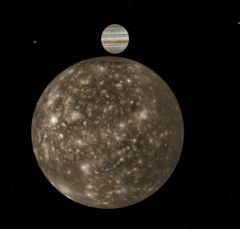Difference between revisions of "Callisto"
(Added SolarSystem template.) |
(Added content.) |
||
| Line 49: | Line 49: | ||
|} | |} | ||
| − | '''Callisto''' is the outermost of [[Jupiter|Jupiter's]] four [[Galilean Moons]], and has been a part of [[Orbiter]] since it was added in Orbiter 2002. | + | '''Callisto''' is the outermost of [[Jupiter|Jupiter's]] four [[Galilean Moons]], and has been a part of [[Orbiter]] since it was added in Orbiter 2002. Callisto is the second largest moon of Jupiter just behind [[Ganymede]], and is the third largest moon after Ganymede and [[Titan]]. And Callisto is just about the same size as the planet [[Mercury]]. Callisto was discovered independently by [[w:Simon Marius]] and [[w:Galileo Galilei]] in 1610, Marius having seen it slightly before Galileo, and the name given by Marius is the one that we use today. |
| + | |||
| + | == Callisto in Orbiter == | ||
| + | Callisto joined Orbiter with the release of Orbiter 2002. At that time its orbit was governed by the Callisto.cfg file, then governed by Vsop87.dll file at the release of Orbiter 2005. | ||
| + | |||
| + | The orbit of Callisto is not locked into an orbital resonance with [[Io]], [[Europa]], and [[Ganymede]], which are in a 1:2:4 resonance. It revolves about 1.88×10<sup>6</sup> kilometers from Jupiter, eccentricity of 0.0074, and an inclination of about 0.25°. The moon has a mass of 1.08×10<sup>23</sup> kilograms and a radius of about 2.4×10<sup>6</sup> km. | ||
[[Category: Articles]] | [[Category: Articles]] | ||
Revision as of 22:49, 11 July 2024
 | This natural satellite related article is a stub. You can help Orbiterwiki by expanding it.
Callisto is the outermost of Jupiter's four Galilean Moons, and has been a part of Orbiter since it was added in Orbiter 2002. Callisto is the second largest moon of Jupiter just behind Ganymede, and is the third largest moon after Ganymede and Titan. And Callisto is just about the same size as the planet Mercury. Callisto was discovered independently by w:Simon Marius and w:Galileo Galilei in 1610, Marius having seen it slightly before Galileo, and the name given by Marius is the one that we use today. Callisto in OrbiterCallisto joined Orbiter with the release of Orbiter 2002. At that time its orbit was governed by the Callisto.cfg file, then governed by Vsop87.dll file at the release of Orbiter 2005. The orbit of Callisto is not locked into an orbital resonance with Io, Europa, and Ganymede, which are in a 1:2:4 resonance. It revolves about 1.88×106 kilometers from Jupiter, eccentricity of 0.0074, and an inclination of about 0.25°. The moon has a mass of 1.08×1023 kilograms and a radius of about 2.4×106 km.
| ||||||||||
